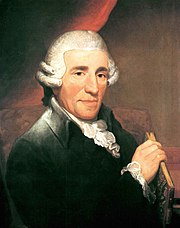La fedeltà premiata
| La fedeltà premiata | |
|---|---|
| Opera by Joseph Haydn | |

Portrait of the composer by Thomas Hardy, in 1791
|
|
| Translation | Fidelity Rewarded |
| Language | Italian |
| Based on |
L'infedeltà fedele by Giambattista Lorenzi |
| Premiere | 25 February 1781 Eszterháza |
La fedeltà premiata (Fidelity Rewarded), Hob. XXVIII/10, is an opera in three acts by Joseph Haydn first performed at Eszterháza on 25 February 1781 to celebrate the reopening of the court theatre after a fire. It was revised for a new version first performed in 1782.
The main opera house adjoining the palace at Eszterháza had been destroyed by fire in November 1779; La fedeltà premiata, composed in 1780, inaugurated the new state-of-the-art theatre in the grounds which opened after major delays 15 months later. The opera was written during the most prolific period of Haydn's operatic composition between 1773 and 1783 when he composed eight Italian operas.
The libretto was adapted by Haydn and an anonymous colleague from Giambattista Lorenzi's L'infedeltà fedele, which had been set by Cimarosa in 1779. Haydn had access to Cimarosa's score, although the Neapolitan dialect and crude jokes were removed and the nine characters in the former setting reduced to eight by the conflation of two female roles. In its revised (and shortened) version, La fedeltà premiata is designated a dramma pastorale giocoso (a comic opera with pastoral elements).
The opera was revived twice in Eszterháza after 1782. In December 1784, Mozart attended a German-language production at the Theater am Kärntnertor in Vienna, the work of his future collaborator Emanuel Schikaneder. However, after some performances in Bratislava from 1785–87, as with all Haydn operas, it disappeared completely from the stage after his death.
In 1958, the BBC broadcast extracts from an incomplete manuscript. The first modern performance took place at the Holland Festival in 1970 and the first complete recording was made by Philips in 1976 in association with the Radio Suisse Romande and the European Broadcasting Union. The 1979 Glyndebourne stage production was due to be recorded by Southern Television.
...
Wikipedia
